'Ten Years': Dark vision of Hong Kong's future proves surprise box office hit
A protester douses her body in petrol and sets herself alight outside the British consulate.
Government assassins kill a local politician to spark a riot that will allow them to seize greater control.
Uniformed "youth guards" attack a bookshop accused of selling banned materials.
This is Hong Kong in 2025, according to hit local film "Ten Years", which has attracted massive audiences amid concerns that Beijing is tightening its grip on the city.
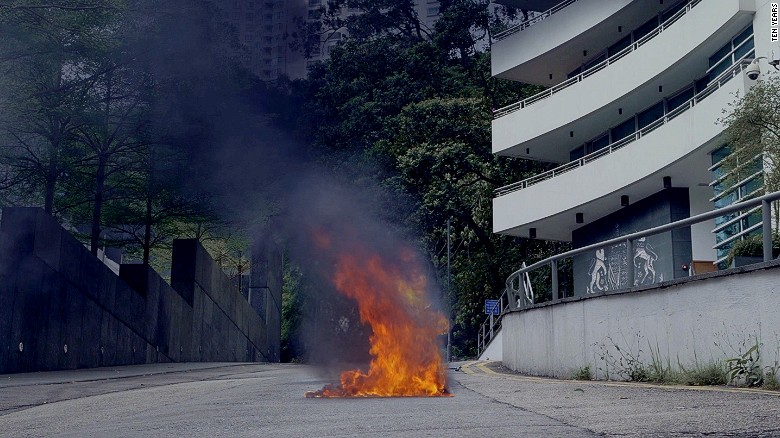
A still from 'Self Immolator', in which a Hong Konger sets themselves on fire in protest.
Outperforming 'Star Wars'
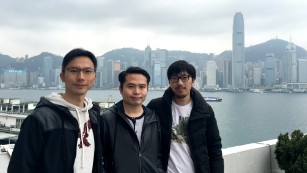
Directors Chow Kwun-wai, Au Mei-kit, and Ng Ka-leung.
"Ten Years" — produced on a shoestring budget by a largely volunteer cast and crew — only opened at one movie theater in the city late last year but it outperformed smash global hit "Star Wars: The Force Awakens," at the arthouse Broadway Cinematheque.
Its initial success has earned "Ten Years" a mass release citywide, and its producers are even in talks with international distributors.
"The reaction was quite unexpected," director and co-producer Ng Ka-leung, 34, told CNN.
"It has resonated with a lot of people in Hong Kong."
The film's success comes as tensions in the city are heightened following the disappearance of several Hong Kongers who published books critical of Chinese leaders, sparking protests in which thousands took to the streets to demand their return.
On Monday, Hong Kong police said that Lee Bo -- who disappeared from the city last month, leading many to fear that he'd been kidnapped -- was in police custody in China. Lee's reappearance comes after his colleague Gui Minhai appeared on Chinese state television on Sunday, to confess to a 2003 hit-and-run incident.
"I am very worried about Hong Kong," said Ng.
A terrifying future
"Ten Years" consists of several short films set in 2025. The most shocking "Self Immolator", opens with a protester setting themselves alight outside the British consulate.
Director Chow Kwun-wai, 36, told CNN that the film was an attempt to shock audiences into taking concrete action to better their situation now, lest they be left with only terrible choices later on.
"Hong Kong has been fighting for democracy for many years, and we've been lied to for many years."
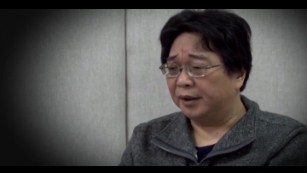
Was Gui Minhai's TV confession made under duress?
Self-immolations have become a desperate and horrifyingly commonplace form of protest in China among Tibetans resisting Beijing's rule and among those protestingforced demolitions.
Chow said that he was worried that Hong Kongers would find themselves in a similarly dire situation unless change is effected soon.
"Even when we had the Umbrella Movement in 2014, nothing concrete was achieved," he said, referring to the mass pro-democracy protests that shut down parts of the city but ultimately did not spur any major concessions from the government.
"Hong Kong people need to contribute more, sacrifice more."
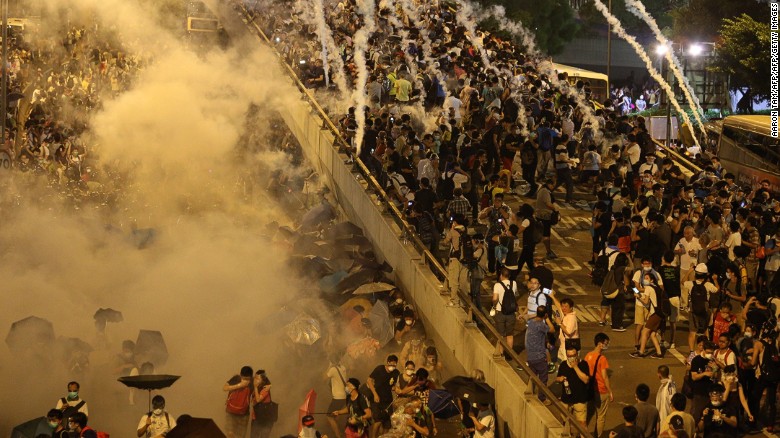
Police fire tear gas at Hong Kong pro-democracy demonstrators.
Lost in translation
Other shorts — particularly "Local Egg" and "Dialect" — touch on feelings of a lost Hong Kong identity as the city moves ever closer to the mainland.
In "Dialect", a taxi driver finds himself unable to work after a regulation requires fluency in Mandarin and marginalizes native Cantonese speakers.
"No one is protecting Cantonese," according to director Au Mei-kit, 34, who said he was inspired to make the film through his own experience as a screenwriter.
"I started out writing Hong Kong movies, writing in the local language," but increasingly, commercial pressure meant he was forced to write in Mandarin for joint Hong Kong-Chinese productions.
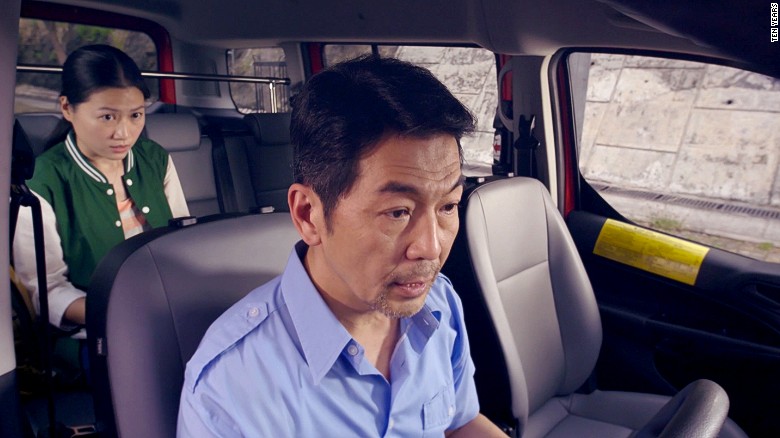
Short film 'Dialect' raises concerns over the preservation of Cantonese.
Au's concerns are widely shared. Proposals have been floated to make Mandarin a requirement for local taxi drivers, though these were ultimately rejected. In China's Cantonese-speaking Guangdong province, there have been protests at what locals see as attempts to marginalize the language.
Cantonese, which predates the modern standardized form of Mandarin, forms a key part of Hong Kong's identity and culture, and is unintelligible to other Chinese speakers.
Despite this, Beijing does not recognize Cantonese (or other non-Mandarin forms of Chinese) as a separate language, referring to it as a "dialect".
Censorship and culture
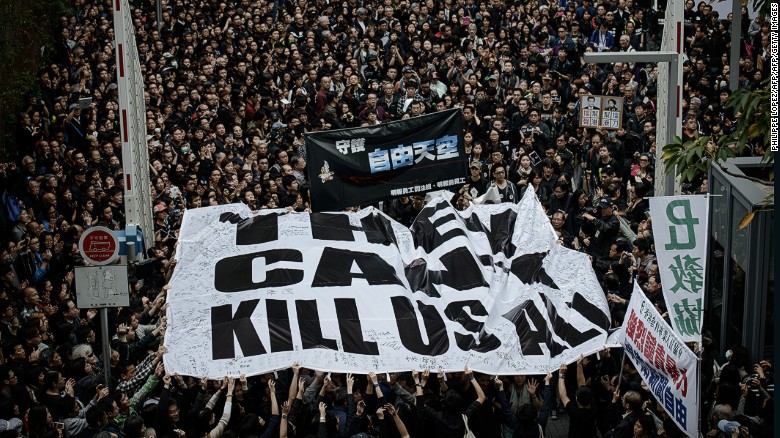
Protesters rally to support press freedom in Hong Kong.
While the message of the film might often be dark, its very existence should be seen as a sign that hope is not completely lost, said Chow.
"We should be grateful that we still have freedom of speech and we have to cherish and protect it."
Nevertheless, the political nature of the film did cause some problems.
"During casting, several actors, when they saw the script, they said they couldn't do it because it's too sensitive," said Chow.
According to Ng, many people they approached were concerned that taking part in the film would affect their ability to work in future, particularly in China.
The disappearance of the Hong Kong booksellers has refueled fears that Beijing is trying to clamp down on free expression in Hong Kong, in contravention of the city's mini-constitution.

Alibaba buying China's largest English newspaper
In its most recent annual report, the Hong Kong Journalists Association said that "press freedom is deteriorating," citing in particular attacks on journalists and the concentration of media ownership in the hands of pro-Beijing businesses or individuals.
"People in Hong Kong live in fear. During the production I heard a lot of concern from my actors and producers," said Chow.
He added: "Yes it can still be shown in the theater, but in the production process, our hearts were not free."
Hope or despair?
While at many times the film may seem to despair for the future of Hong Kong, Chow said that its ultimate message is one of hope.
"Some audiences, they see despair, but when I look into their eyes and spoke to them, they were so eager to find solutions for Hong Kong after watching the move," he said.
Ng said that he spoke to Hong Kongers from all walks of society for the project, and when he asked them about the future, "I saw flames in their eyes, it's like they're filled with energy."
"We caught that passion and decided to put it on the screen."
In many ways, the directors said they hoped the film would jar people into taking action to prevent it becoming reality.
"A lot of people in Hong Kong don't talk about politics," Chow said.
"Many people are thinking about emigrating to other places, it's happening again," he added, referring to the mass exodus of Hong Kongers in the years leading up to the 1997 handover of sovereignty from the UK to China.
"How many people are willing to stay in Hong Kong and fight back? How many people are willing to defend Hong Kong? Will people just give up on our home?"
News Courtesy: www.cnn.com











